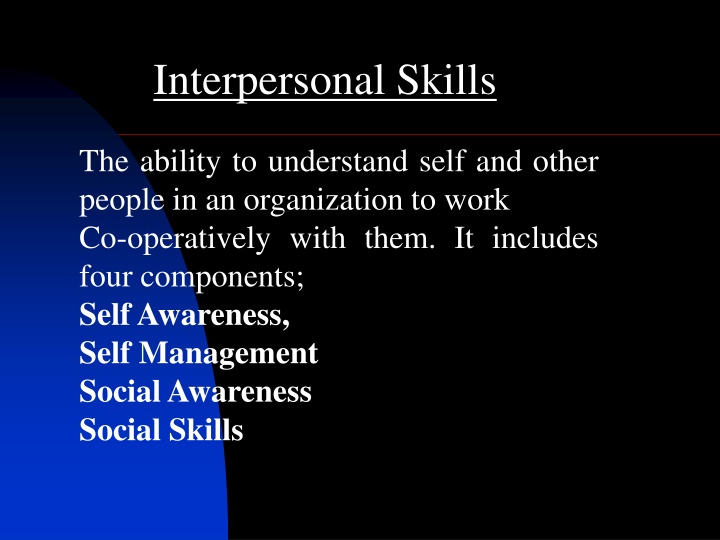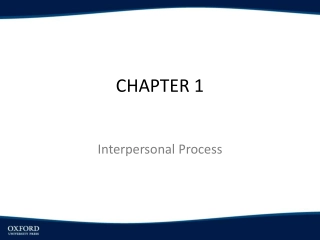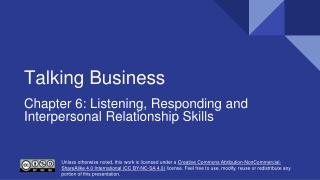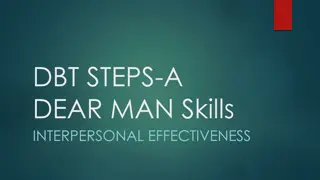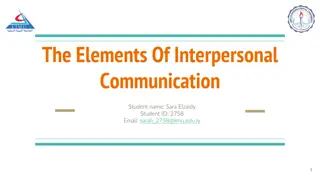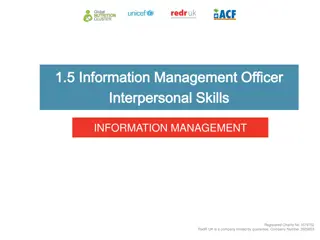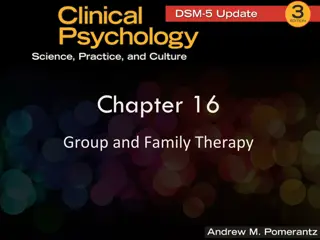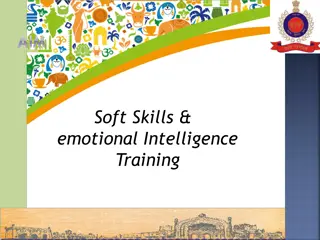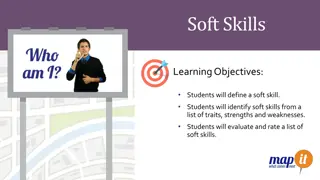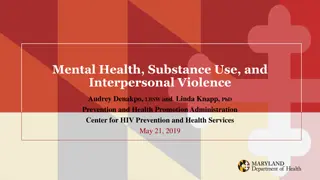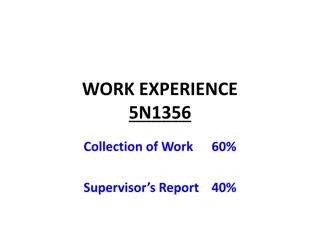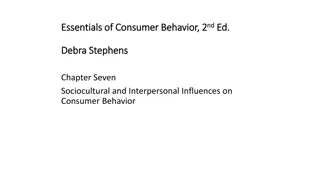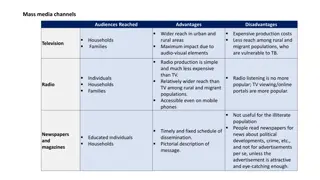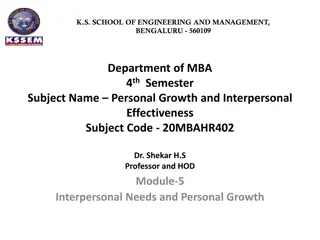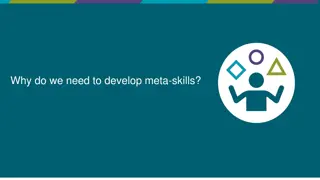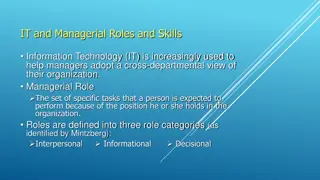Interpersonal Skills
Develop self-awareness, self-management, social awareness, and social skills to foster positive relationships in organizations. Understand the importance of knowing yourself, self-regulation, and techniques to build rapport with others. Cultivate a conducive environment that promotes trust, safety, and fairness. Discover strategies to make people like you and fundamental techniques in handling interactions with authenticity and appreciation.
Download Presentation

Please find below an Image/Link to download the presentation.
The content on the website is provided AS IS for your information and personal use only. It may not be sold, licensed, or shared on other websites without obtaining consent from the author.If you encounter any issues during the download, it is possible that the publisher has removed the file from their server.
You are allowed to download the files provided on this website for personal or commercial use, subject to the condition that they are used lawfully. All files are the property of their respective owners.
The content on the website is provided AS IS for your information and personal use only. It may not be sold, licensed, or shared on other websites without obtaining consent from the author.
E N D
Presentation Transcript
Interpersonal Skills The ability to understand self and other people in an organization to work Co-operatively with them. It includes four components; Self Awareness, Self Management Social Awareness Social Skills
Self-Awareness/Self-Perception This is a key aspect of being a leader The ability to recognize and understand your moods, emotions, and drives, as well as their effect on others Self-confidence (but not arrogance) Self-assessment Self-deprecating - sense of humor (rolling with the punches) What are my strengths and weaknesses
Knowing Yourself Good timber does not grow with ease; the stronger the wind, the stronger the trees - J. Willard Marriott
Knowing Yourself Being aware of how people respond to you
Self-Regulation This is another key aspect of being a leader Self-regulation is the ability to manage your emotions and reactions Others can and should be understanding, but SELF- regulation -- is up to YOU! Bad scenes stick in people s minds
Self-Regulation Creates an environment of trust, safety, and fairness Discourages those around you from losing control or reacting impulsively Helps you avoid the temptation of easy or quick fixes Is characterized by thoughtful reflection and being comfortable with uncertainty
Six ways to make people like you Become genuinely interested in other people. Smile. Remember that a person's name is to that person the sweetest and most important sound in any language. Be a good listener. Encourage others to talk about themselves. Talk in terms of the other person's interests. Make the other person feel important - and do it sincerely.
Fundamental Techniques in Handling People Don't criticize, condemn or complain. Give honest and sincere appreciation. Arouse in the other person an eager want.
TRANSACTIONAL ANALYSIS Study of inter and intra individual transactions where there is a stimulus and response . Transactional analysis is a method of analyzing human behavior in social transactions. It is a study of human relations through the study of stimuli and response. It is an extension of Freudian theory Id Ego Super Ego TA was developed by Eric Berne and popularized by Harries. Marial James, Dorthy Jongeward and Wagner.
Psycho-Analytical or Psycho-Dynamic Theory Sigmund Freud s STRUCTURAL MODEL OF MENTAL LIFE ID Psychic energy Inherited, Presented at birth, Present in life. Store of wishes and unconscious. Strives for immediate pleasure and avoid pain. Insistent and rash. Does not tolerate un-comforts-tension. Immoral, animal drives, Unorganized. EGO The Gateway of Action Separates reality from unreality, Logical, realistic, practical and rational. Consciously distinguish between the demands of ID & Realities. Regulate and integrate inner motives and source of Tension release. SUPER EGO Sensor agent of Value, belief and standards of the society. Ideals & noble thoughts. Acquired from parents, teachers, friends, religion, etc., Describes the right and wrong. Mediates, filters action.
EGO A Psychological State of an Individual, which Guide the Way of Feeling, Thinking and Behavior EGO Status PARENT (Taught Ego) Controlling Protective Critical Nurturing Instructive Help --------------- Control Rational Factual Unemotional Independent Problem solver ADULT (Acquired by Maturity) Free Dependent Curious Rebel Frustrated Spontaneous Creative Clumsy Pleasure seeking CHILD (Felt Ego) LP Adp
LIFE POSITIONS Assumption about self and others in the Societies I am OK I am not OK I am not OK I am OK - - - - You are not OK You are OK You are not OK You are OK Attitude Towards Self I am OK You are not OK I am OK You are OK POSITIVE I am not OK You are not OK I am not OK You are OK NEGATIVE NEGATIVE POSITIVE
Types of Transactions COMPLIMENTARY OPEN P P P P C A A C C C P= Parent A=Adult C=Child A A C C CROSS P P BLOCKED P A C - P A A C C ULTERIOR - - Transactions influenced by other than ego status (Hidden Meanings) GALLOWS TRANSACTIONS - - In appropriate smile or love GAMES Repeat, Find it ulterior, Sense at superficial level INEFFECTIVE STYLES OF GAMES Perfectionist, Driver, Power game, and Pleasure game
LIFE SCRIPTS AND STROKES: A stroke is a unit of recognition may be positive or negative of a condition or both, strokes are required for healthy behavior. Strokes may be physical, verbal or eye-to-eye contact. Child hood learning influences the behavior If a child lives with criticism, he/she learns to fight. If a child lives with hostility, he/she learns to condemn. If a child lives with ridicule, he/she learns to be shy. If a child lives with shame, he/she learns to feel guilty. If a child lives with tolerance, he/she learns to be patient. If a child lives with encouragement, he/she learns confidence. If a child lives with praise, he/she learns to appreciate. If a child lives with fairness, he/she learns justice. If a child lives with security, he/she learns to have faith. If a child lives with approval, he/she learns to like himself. If a child lives with acceptance and friendship, he/she learns to find love in the world.
JOHARI WINDOW Feed Back Known to Self Unknown to Self Discussion Known to others Open Area Blind Area Unknown to others Hidden Area Unknown Area
Dealing with Difficult People
How to deal with Difficult people? Hostile Aggressive Stand up for your self Give them time to turn down use self assertive language avoid direct Confrontation.
Complainers Listen attentively Acknowledge their feelings Avoid complaining with them Tell the truth without apology
Clams Ask open ended questions. Be patient and wait for response. If there is no response, tell your opinion.
Super Agreeables Find out why they will not work Let them know that you respect them Ready to act, don t allow to make unrealistic commitments Discern the hidden meaning in their humour
Negatives Don t get dragged to their despair Don t try to Cajole them out of their negativism Discuss the issue in detail - show the negative side of yours Ready to act without agreement
Know it all Bulldozers Prepare yourself. Listen and paraphrase their main points. Use the Questioning forms to raise problems.
Balloons State facts as your perspective of reality. Find a way for them to save face. Confront them alone, not in public.
Indecisive Stallers Raise the issue why they are hesitant . If you are the problem, ask for help. Keep the action at your own hand. Remove them from the situation, if possible.
Emotional Intelligence (EI) The capacity for recognizing our feelings and those of others; for motivating ourselves and others; for managing emotions in ourselves and in our relationships Understanding yourself (self-awareness) Managing yourself (self-regulation) Understanding others (empathy) Managing others (motivation, social skills)
Knowing Yourself Taking criticism tough medicine to swallow, but usually always valuable
Knowing Yourself Giving criticism -- kindly? Leaders have to bring correction, but HOW it s brought can make or literally break someone
